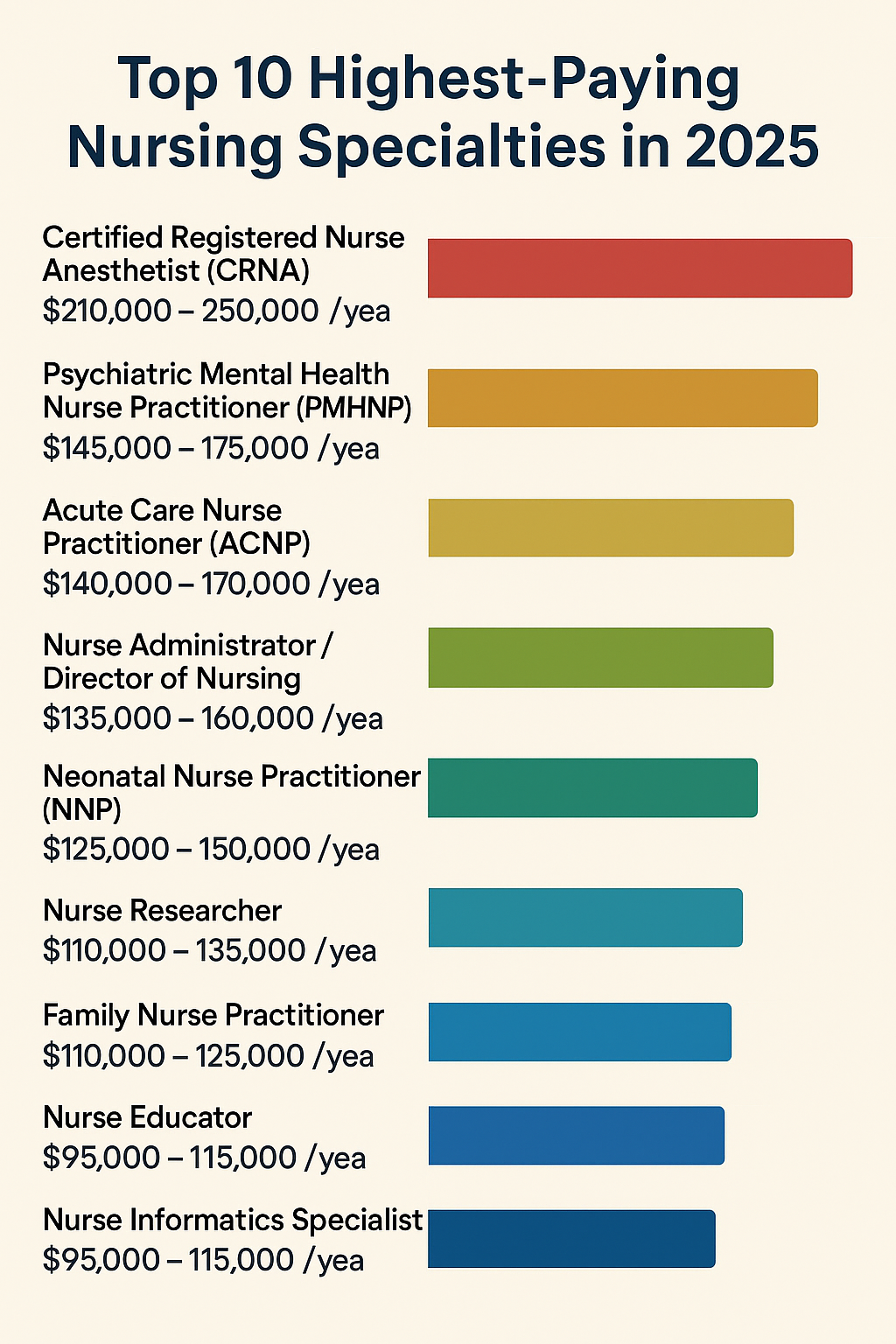If you’re a nurse who has ever whispered during a night shift, “I can’t keep doing 12s forever,” trust me — you’re not alone. Bedside nursing builds resilience, skills, and enough stories to keep Thanksgiving dinners entertaining for decades. But for many of us, there comes a point when the scrubs, call lights, and “just one more IV before shift change” start to wear us down.
Here’s the good news: nursing doesn’t end at the bedside. In 2025, more non-bedside opportunities exist than ever before. From compliance and case management to education, occupational health, and informatics, nurses are stepping into new roles that use their clinical expertise in different — and often less physically demanding — ways.
This guide will walk you through the top non-bedside nursing careers, the steps to get there, and the pros and cons of each path. I’ll also share my own journey out of bedside nursing, to show you that it’s possible to pivot without losing your nursing identity.
Why Nurses Are Leaving the Bedside
The American Nurses Association (ANA) has consistently highlighted workplace challenges like burnout, staffing shortages, and rising patient acuity as key drivers pushing nurses toward alternative career paths. According to the CDC, nearly 1 in 5 healthcare workers left their jobs between 2020 and 2023, and nurses were among the hardest hit.
Meanwhile, the Bureau of Labor Statistics (BLS) projects that demand for registered nurses will continue to grow 6% through 2032 — but not all of that demand is at the bedside. Increasingly, healthcare systems, corporations, and universities need nurses in policy, education, compliance, and tech roles.
👉 Focus Keywords: non-bedside nursing jobs, alternative nursing careers, nurse career change, nursing roles outside the hospital.
My Path Out of the Bedside
After nearly 15 years working in ICU, procedural units, and occupational health, I felt the shift. I loved patient care, but the emotional load and rotating schedules weren’t sustainable. I transitioned into compliance and policy work at a large research university. Now I oversee compliance frameworks, advise leaders, and still use my clinical lens daily — just in a different way.
The takeaway? You don’t “leave nursing” when you leave the bedside. You carry it into every new role.
Top Non-Bedside Nursing Careers in 2025
Here’s your roadmap to the most in-demand, highest-value nursing jobs outside the hospital — with salary ranges, steps to qualify, and where they fit in today’s healthcare landscape.
1. Nurse Educator
- Average Salary (2025): $95,000 – $115,000/year (higher with tenure or doctoral prep)
- What They Do: Teach in nursing schools, lead hospital training programs, and prepare the next generation of nurses.
- Education Needed: MSN, DNP, or PhD; teaching certificate helpful.
Authority Reference: The American Association of Colleges of Nursing (AACN) notes that the U.S. faces a critical shortage of nurse educators, limiting the number of students nursing programs can accept.
Pros:
- Rewarding: shaping future nurses.
- More stable schedules (days, some hybrid opportunities).
- Opportunities for research and publishing.
Cons:
- Pay can be lower than clinical roles.
- Academic politics (yes, they exist).
- Constant grading and mentoring.
💡 Humor Take: You’ll still hear “Can I go to the bathroom?” — but now it’s from nursing students instead of patients.
2. Case Management Nurse
- Average Salary (2025): $90,000 – $110,000/year
- What They Do: Coordinate patient care across settings, ensuring treatments are effective and cost-efficient.
- Education Needed: BSN, CCM certification preferred.
Authority Reference: According to the Commission for Case Manager Certification, case managers improve both patient outcomes and system efficiency — making them indispensable in a value-based care environment.
Pros:
- Standard business hours.
- Builds deep patient relationships without bedside demands.
- Growing demand with aging population.
Cons:
- Lots of phone calls and paperwork.
- Dealing with insurance companies can test your patience.
- Sometimes stuck between patient needs and payer restrictions.
3. Nurse Compliance Officer
- Average Salary (2025): $100,000 – $130,000/year
- What They Do: Ensure organizations comply with HIPAA, OSHA, CMS, and DOJ standards.
- Education Needed: BSN or MSN; Compliance Certification (CHC) helpful.
Authority Reference: The U.S. Department of Health and Human Services (HHS) stresses compliance programs as essential for reducing fraud and improving healthcare quality — making nurses uniquely valuable in these roles.
Pros:
- High demand in hospitals, universities, and research centers.
- Regular schedules, often hybrid or office-based.
- Career ladder into leadership (Chief Compliance Officer).
Cons:
- Heavy focus on policy and regulations.
- Less direct patient interaction.
- Constantly adapting to new laws.
4. Occupational Health Nurse
- Average Salary (2025): $85,000 – $105,000/year
- What They Do: Promote employee wellness, manage workplace injuries, and ensure OSHA compliance.
- Education Needed: BSN; COHN certification is a plus.
Authority Reference: The CDC’s National Institute for Occupational Safety and Health (NIOSH) underscores the critical role occupational health nurses play in keeping workers safe.
5. Nurse Informatics Specialist
- Average Salary (2025): $95,000 – $115,000/year
- What They Do: Integrate nursing and technology by improving EHRs and managing clinical data.
- Education Needed: BSN + informatics certificate or MSN.
Authority Reference: The Healthcare Information and Management Systems Society (HIMSS) reports informatics as one of the fastest-growing roles in healthcare.
6. Nurse Researcher
- Average Salary (2025): $110,000 – $135,000/year
- What They Do: Conduct clinical research and publish studies.
- Education Needed: MSN or PhD.
Authority Reference: The National Institute of Nursing Research (NINR) funds nursing research to improve outcomes — and demand for nurse researchers is growing with precision medicine.
7. Legal Nurse Consultant
- Average Salary (2025): $85,000 – $120,000/year
- What They Do: Help attorneys interpret medical records, provide case reviews, and serve as expert witnesses.
- Education Needed: BSN; legal nurse consultant certification is helpful.
Authority Reference: The American Association of Legal Nurse Consultants (AALNC) highlights this as a growing niche for nurses seeking independent practice.
8. Public Health Nurse
- Average Salary (2025): $75,000 – $95,000/year
- What They Do: Work in communities to prevent disease and promote health.
- Education Needed: BSN or MSN in public health.
Authority Reference: The CDC emphasizes the importance of public health nurses in reducing disparities and improving population health.
9. Utilization Review Nurse
- Average Salary (2025): $85,000 – $105,000/year
- What They Do: Ensure medical services are appropriate and cost-effective.
- Education Needed: BSN, UR experience preferred.
Authority Reference: The Centers for Medicare & Medicaid Services (CMS) mandates utilization review processes, making nurses with clinical insight essential in this role.
10. Nurse Writer / Content Creator
- Average Salary (2025): $50,000 – $100,000+ (variable)
- What They Do: Write for publications, healthcare companies, or blogs (like this one).
- Education Needed: BSN, strong writing skills.
Authority Reference: The ANA encourages nurses to engage in communication and advocacy — making writing and content creation a legitimate extension of nursing expertise.
Steps to Transition Out of the Bedside
- Identify your transferable skills. Leadership, teamwork, documentation — bedside nurses have gold-standard skills.
- Seek certifications. CCM, CHC, COHN, Informatics — certifications demonstrate credibility.
- Network actively. LinkedIn, ANA chapters, and specialty organizations open doors.
- Build experience. Volunteer on unit-based councils, serve on compliance committees, or assist in staff education.
- Polish your resume. Use action verbs, measurable outcomes, and focus on skills aligned with your target role.
- Stay current. Follow BLS and ANA data to know which roles are trending.
Final Thoughts
Leaving the bedside doesn’t mean leaving nursing. It means expanding it. Non-bedside careers allow nurses to use their expertise in new, impactful ways — without sacrificing their health or sanity.
Whether you choose compliance, education, informatics, case management, or even writing, the key is knowing that your clinical background is your superpower. You’ve already proven you can think critically under pressure, care deeply for others, and manage the chaos of a 12-hour shift. Every employer outside the bedside values those same skills.
👉 In 2025, the nursing profession is more versatile than ever. Your next career chapter is waiting.





